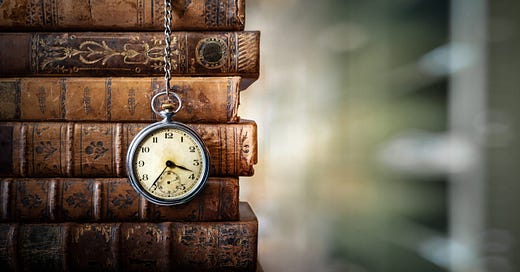History as a Remarkable Seminary
How Studying the Past Formed My Ministerial Calling
When I decided to pursue a PhD about five years ago, people asked me what I’d be focusing my doctoral studies on, I always delighted in the awkward pause after I said, “History.” Their brows furrowed, waiting for the punchline. “Not theology?” they’d ask. “Not counseling or ethics or, you know… something pastoral?” Nope. History. The whole mess of it.
And what a beautiful mess it is.
Now this decision was fueled not only by my immense love for history, but also because history is deeply connected with two key tenants of a minister’s life: people and ideas. History is the story of people and ideas. It is the story of empires that rose and fell on a whisper, of mothers who prayed, soldiers who wept, revolutionaries who thought they were saving the world (some of them actually did), and preachers who held trembling congregations together with nothing but the Word and an unwavering resolve to see Christ glorified in them whether it be through their life or death.
History also gave me the one thing every minister desperately needs: humility.
You see, it’s easy to think you’ve arrived when you stand behind a pulpit or wear a uniform with a cross stitched neatly on your chest. But nothing deflates that ego faster than watching the grand parade of men and women smarter, godlier, braver, and more articulate than you walk onto the stage of history and quietly disappear.
Kings, saints, heretics, and forgotten farmers. All of them were flesh and blood. All of them carried burdens. And all of them, whether they knew it or not, were caught in the great story God has been telling since Eden.
Studying history was never just about the facts for me. It was about the impulse behind the facts. The religious impulse. That strange, inescapable longing for transcendence that echoes across every culture, every war, every cathedral and every battlefield. Something in us cries out for the eternal, even as we crumble in time.
When you sit long enough with the stories of the past, you begin to see that hman beings are not just economic creatures or political pawns. We are worshiping creatures. We bow to something, whether God or self, Caesar or Mammon, Tribe or Nation.
That’s why I wanted to do more than just read history. I wanted to listen to it because buried in the records of the past is the heartbeat of humanity thumping in rhythm with praise, rebellion, hope, and despair.
Being in ministry, the study of history saved me from reductionism, which is the tempting tendency to explain everything away with a single theory. You know the type. “Everything is just a power struggle.” “Everything is about economics.” “Everything is psychology.”
Please. Spend five minutes reading Augustine’s Confessions or the fierce prayers of enslaved believers in antebellum America, and try reducing that to economic determinism. History reminds you that life and people can’t be put into neat little boxes. We are complicated, contradictory, glorious and grotesque. We are, in short, image-bearers with mud on our faces.
As a a chaplain, history gave me language for sorrow. It helped me name griefs too deep for words. I think of the trench letters from World War I, or the diary entries from widows after the Civil War, or the haunting hymns sung by black mothers mourning their sons in the Jim Crow South. These voices taught me that I’m not the first to wrestle with despair, or with faith, or with the silence of God in the midst of suffering. They also reminded me that the Church has always been forged in fire, and yet, she sings and lives and grows despite the sorrows she’s seen and at times inflicted.
And here’s my shameless pastoral-historian plug: dear reader, get a little more history in your diet.
No, I’m not suggesting you suddenly develop a crush on Tacitus or start quoting footnotes at dinner parties (you’ll make a good writer in Substacn). But you should be curious. Ask your grandparents about their childhood. Pick up a biography. Watch a good documentary on the past. Look deep into the origins of different ideas. Read about someone who lived in a century other than your own and wrestled with doubts and hopes like you do.
Why? Because it’ll humble you. It’ll expand your heart. It’ll thicken your skin and soften your judgments. It’ll make you slower to speak and quicker to listen. It might even make you a little worried and funnier at parties (no guarantees). History won’t save your soul, but it can transform your perspective.
I’ll end with this: faithful ministers are not merely dispensers of wisdom, we are stewards of truth that is rooted in time and space. The incarnation was a concrete reality where God entered history through the body of a young Jewish woman, under the shadow of an empire, in the dust of a particular land. The gospel is not an abstract philosophy; it is a declaration that eternity broke into time.
To study history, then, is to trace the weight of that in-breaking. To see in the annals, how the hallmarks of humanity and the hand of providence have moved through kings and commoners, through revivals and revolutions, through suffering and grace. It reminds us that we are not the first to believe, to doubt, to rebel, to endure, or to hope.
So I study the past not to escape the present, but to better dwell in it. History has refined me as a minister in ways I can't fully describe and connected me with companions who have long since passed through the veil of this life into the next. In the pages of the past, I have found guidance, warning, wisdom, and wonder. I hope you too will take regular opportunities to explore the grand story of humanity past to better equip you to care for humanity present.




